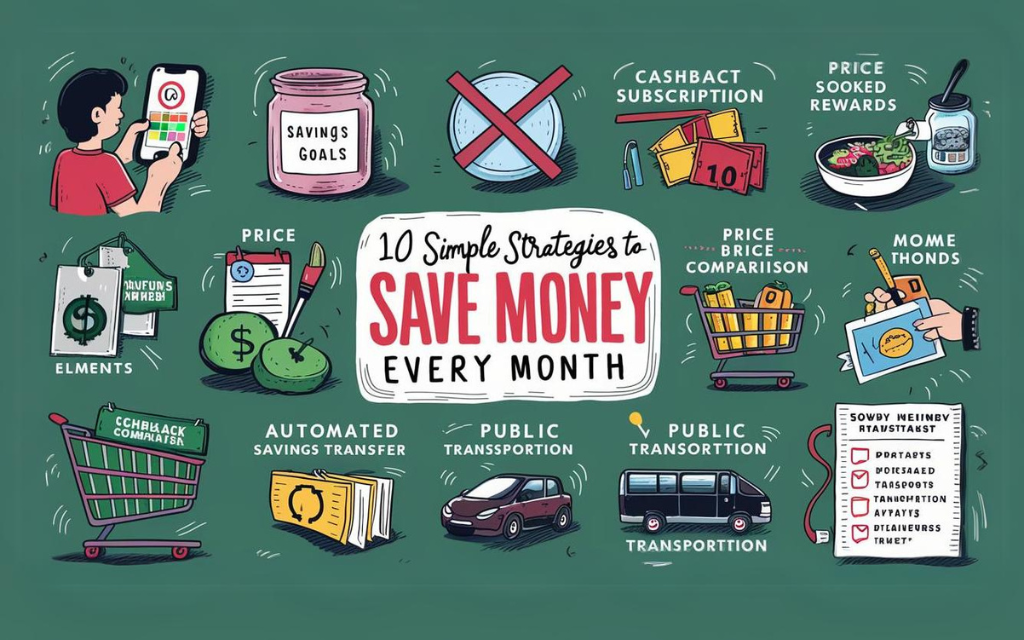Managing finances can be challenging, especially for young adults just starting their financial journeys. It can often feel overwhelming to juggle expenses, savings, and investments all at once. The good news is that you don’t have to navigate these waters alone. By adopting smart strategies and making informed decisions, you can pave the way to a secure financial future. But don’t worry—these ten practical money-saving tips will help you build good habits and lay a strong foundation for financial stability. With a little discipline and the right guidance, you can turn these tips into lifelong habits. Let’s dive in and explore how you can take control of your finances and achieve your goals!
1. Create a Budget
Master Your Finances with a Solid Budget
The first step to saving money is understanding where it goes. Start by tracking your income and expenses meticulously. Utilize budgeting apps such as Mint or YNAB (You Need A Budget) to assist with this process. These tools can help you categorize your spending patterns effectively. By doing so, you can pinpoint specific areas where you may be overspending and identify opportunities for cost-saving measures. For example, if you notice a significant portion of your budget is going towards dining out, you might consider preparing more meals at home. Cooking at home can be both economical and rewarding, offering you the chance to experiment with new recipes and enjoy healthier meals. Additionally, regularly reviewing your financial habits ensures you stay on top of your finances and make informed decisions about your spending. Saving money isn’t just about cutting costs; it’s about making conscious choices that align with your financial goals.
2. Set Savings Goals
Plan for the Future with Clear Savings Goals
Having clear, attainable savings goals will motivate you to save more effectively. It’s important to identify exactly what you are saving for, whether it’s a dream vacation, a new gadget you’ve been eyeing, or building an emergency fund for unexpected expenses. By setting specific amounts and deadlines for each goal, you create a roadmap for your financial journey, making the process more structured and achievable.
Moreover, leveraging technology can further streamline your savings efforts. Tools like Simple or Qapital are excellent resources that can help automate your savings towards these goals. These tools can break down your savings targets into manageable parts, track your progress, and even move funds into designated accounts without requiring ongoing manual effort. By using such tools, you can ensure your savings plan remains on track and adapt as your financial situation evolves.
Ultimately, the combination of clear goals, specific deadlines, and technological assistance will not only enhance your ability to save but also provide a sense of accomplishment and financial security.
3. Cut Down on Subscriptions
Eliminate Unnecessary Expenses
Streaming services, gym memberships, and magazine subscriptions can add up quickly, often leading to unexpectedly high monthly expenses. It’s a good idea to periodically review all your subscriptions and take a closer look at what you’re paying for. Cancel any services that you don’t use regularly or that no longer provide value to you. There are also helpful services like Trim that can assist in identifying and canceling unused subscriptions for you, making it easier to manage and reduce your monthly spending. By staying on top of these recurring expenses, you can free up more of your budget for things that truly matter to you.
4. Use Cashback and Rewards Programs
Earn While You Spend
Make the most of your purchases by using cashback apps like Rakuten or Honey, which can help you save money on a wide range of products and services. Additionally, many credit cards offer rewards points or cashback on everyday purchases, allowing you to accumulate benefits that can be redeemed for travel, merchandise, or statement credits. By strategically combining these tools, you can maximize your savings and get more value out of your spending. However, it’s crucial to manage your finances wisely; make sure to pay off your credit card balance in full each month to avoid interest charges and maintain a healthy credit score. This way, you can enjoy the advantages of these programs without falling into debt.
5. Cook at Home
Save Money and Eat Healthier
Eating out or ordering takeout can quickly drain your wallet, leaving you with less money to spend on other important things. By planning your meals and cooking at home, you can save a significant amount of money over time. Not only is it a cheaper alternative, but it’s also a healthier option since you have full control over the ingredients and portion sizes. Websites like Budget Bytes offer a wealth of delicious, budget-friendly recipes to get you started on your meal planning journey. Additionally, cooking at home can be a fun and rewarding experience where you can experiment with new recipes, improve your cooking skills, and even bond with family members or friends while preparing meals together.
6. Shop Smart
Get the Best Deals on Your Purchases
Always compare prices before making a purchase to ensure you are getting the best deal. Utilize price comparison websites such as Google Shopping or apps like ShopSavvy to find the lowest prices available. Additionally, keep an eye out for sales and special promotions, use coupons to save money, and consider buying in bulk when possible to maximize savings. By taking these extra steps, you can make more informed purchasing decisions and stretch your budget further.
7. Limit Impulse Purchases
Think Twice Before Buying
Impulse buying is a common budget buster that can derail your financial goals. It often happens when we make spontaneous decisions to purchase items we don’t necessarily need. To combat this, before making a purchase, try to wait 24 hours to see if you still want it. This cooling-off period provides a moment of reflection and can help you avoid unnecessary spending. Additionally, using budgeting apps like PocketGuard can be beneficial. These apps can alert you if you’re nearing your spending limits, helping you stay on track with your budget and make more informed financial decisions. Taking these steps can contribute significantly to better financial health and long-term savings.
8. Automate Your Savings
Make Saving Effortless
Automate your savings by setting up regular transfers from your checking account to your savings account. This simple step ensures that you’re consistently saving money without having to think about it each time. By setting up these automatic transfers, you create a habit of saving that can lead to significant financial growth over time. Many banks offer automatic savings plans, which can make this process even easier. Take advantage of these options and set yourself up for financial success. By automating your savings, you can focus on other aspects of your financial goals and enjoy the peace of mind that comes with knowing your savings are continually growing.
9. Use Public Transportation
Save on Travel Costs
If you live in a city with reliable public transportation, consider using it instead of driving. Utilizing public transit can significantly reduce your expenses by saving money on gas, parking fees, and vehicle maintenance costs. Additionally, using public transportation can be more environmentally friendly, reducing your carbon footprint and contributing to a cleaner environment. Alternatively, for short distances, consider biking or walking. These methods not only save even more money but also provide excellent opportunities for physical exercise and improving your overall health. Embracing these alternative modes of transportation can lead to numerous benefits for both your wallet and well-being.
10. Review Your Insurance Policies
Ensure You’re Not Overpaying
Regularly reviewing your insurance policies is essential to ensure you’re getting the best rates and coverage for your needs. By taking the time to shop around and compare quotes from various providers, you can potentially save a significant amount of money. Websites like Policygenius offer a convenient way to explore and find better deals on different types of insurance, including auto, home, and health. Additionally, staying informed about the latest offers and discounts can further help you optimize your insurance plans. Don’t hesitate to periodically reassess your insurance needs and make adjustments as necessary to protect your financial well-being effectively.
Conclusion
Saving money doesn’t have to be complicated or restrictive. By implementing these simple strategies, you can make significant progress toward your financial goals. Start small, stay consistent, and watch your savings grow.
Disclaimer
The information provided in this document is for general informational purposes only and is not intended to be financial advice. Always consult with a qualified financial advisor before making any financial decisions. The strategies and tips mentioned may not be suitable for everyone, and individual circumstances can vary. While we strive to ensure the accuracy of the information, we make no guarantees of its applicability or reliability. Use the information at your own discretion and risk.




